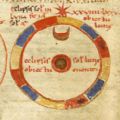- Somnium Scipionis
-
This page is about a story by Cicero. For the book by Iain Pears, see The Dream of Scipio (book).
 Scipio Africanus the Elder, who in Cicero's story appears to his grandson and tells him of the universe and his destiny.
Scipio Africanus the Elder, who in Cicero's story appears to his grandson and tells him of the universe and his destiny.
The Dream of Scipio (Latin, Somnium Scipionis), written by Cicero, is the sixth book of De re publica, and describes a fictional dream vision of the Roman general Scipio Aemilianus, set two years before he commanded at the destruction of Carthage in 146 BCE.
Upon his arrival in Africa, Scipio Aemilianus is visited by his dead grandfather (by adoption), Scipio Africanus, hero of the Second Punic War. He finds himself looking down upon Carthage "from a high place full of stars, shining and splendid". His future is foretold by his grandfather, and great stress is placed upon the loyal duty of the Roman soldier, who will as a reward after death "inhabit..that circle that shines forth among the stars which you have learned from the Greeks to call the Milky Way". Nevertheless, Scipio Aemilianus sees that Rome is an insignificant part of the earth, which is itself dwarfed by the stars. The planetary spheres are enumerated with references to Pythagorean thought and the idea of the Music of the Spheres. Then the climatic belts of the earth are observed, from the snow fields to the deserts, and there is discussion of the nature of the Divine, the soul and virtue, from the Stoic point of view.
De re publica (On the Republic) is a treatise on the history, laws, and polity of the Roman republic; the Dream of Scipio appears in the sixth book of this partly lost work.
Contents
Relation to other Works
The tale is modelled on The Myth of Er in Plato's Republic.[1] Although the story of Er records a near-death experience, while the journey of Scipio's "disembodied soul" takes place in a dream, both give examples of belief in astral projection.[2]
Macrobius' Commentary upon Scipio's Dream was known to the sixth-century philosopher Boethius, and was later valued throughout the Middle Ages as a primer of cosmology. The work assumed the astrological cosmos formulated by Claudius Ptolemy. Chretien de Troyes referred to Macrobius' work in his first Arthurian romance, Erec, and it was a model for Dante's account of heaven and hell. Chaucer referred to the work in The Nun's Priest's Tale and especially in the Parlement of Foules.
Some critics consider Raphael's painting Vision of a Knight to be a depiction of Scipio's Dream.
The composer Mozart, at the age of fifteen, wrote a short opera entitled Il sogno di Scipione (K. 126) based upon Scipio Aemilianus's 'soul-journey' through the cosmos.
Iain Pears wrote a historical novel called "The Dream of Scipio" which refers to Cicero's work in various direct and indirect ways.
Bernard Field, in the preface to his "History of Science Fiction", cited Scipio's vision of the of Earth as seen from a big height as a forerunner of modern science fiction writers describing the experience of flying in orbit - particularly noting the similarity between Scipio's realization the Rome is but a small part of the Earth with similar feeling by characters in Arthur C. Clarke's works.
Gallery
Images from a 12th century manuscript of Macrobius' Commentarii in Somnium Scipionis (Parchment, 50 ff.; 23.9 × 14 cm; Southern France). Date: ca. 1150. Source: Copenhagen, Det Kongelige Bibliotek, ms. NKS 218 4°.
-
The five climes of the Earth. Frozen climes in yellow; Temperate climes in blue; Torrid clime in red.
References
External links
- The Somnium Scipionis (in Latin)
- The Dream of Scipio (in English)
Categories:- Philosophical works of Cicero
- Visionary literature
- Metaphysical cosmology
- Early scientific cosmologies
- Ancient astronomy
- Philosophical arguments
- Roman underworld
- Death in Greek philosophy
Wikimedia Foundation. 2010.






